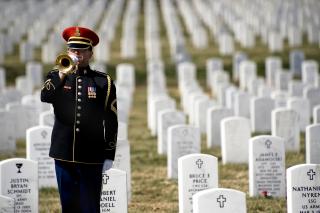Remembering Well

The first time I ever played “Taps” was at summer camp when I was ten years old. That was the year I started playing trumpet, so I can only imagine how it sounded. I know there was no way that I could have hit the high note near the end.
The first time I played Taps in honor of those who died was in high school, when I was contacted by the local Legion commander. He asked if I would mind occasionally being called on to play Taps at graveside services for veterans. I agreed.
For the next couple of years, when there was a need, I would take my place with the Legion honor guard, wait for the three volleys of shots to ring out, and play the simple 24 notes of Taps as clearly and as best I could.
Each time, the Legion commander would quietly slip me a ten dollar bill — and that’s about all that Taps meant to me, for a while: it was easy to do, it got me out of school, and I earned a little money.
And then one day that changed.
The man I was called upon to play for that day was the father of one of my Boy Scout leaders. Back then, like most of the adults I knew, I thought my assistant scoutmaster was pretty old. But his father was a World War II veteran, so now, thinking back, that means that both my leader and his father were relatively young—too young—for their places there that morning, as the honored dead and as the grieving son.
That day, as I began to play Taps, this man—who I knew as wise, and kind, and relatively hard in the Old Boy, Boy Scout, wilderness leader sort of way— fell to his knees, overwhelmed with tears.
I’m not sure how I made it through the whole piece that day, but after that I thought I might never be able to play Taps again.
Today, whether I’m playing it or hearing it, Taps means something close to what it once meant, to the reasons for which it was written and originally used.
Once upon a time, Taps was a signal that the camp was relatively safe. It meant that you were not under siege, or under attack of any kind. It meant that you were reasonably sure that there were no enemy soldiers to worry about at least a bugle call’s distance away.
To a whole camp of soldiers, the notes of Taps meant that, unless you were on duty, you could close your eyes and you could sleep in peace.
I didn’t know that story, or that sentiment all those years ago, when I played Taps for pocket money in the local cemetery. But in that meaning of Taps, something speaks to me in my heart and soul about dying, and, for those of us who remain, about remembering well.
| Date added | |
|---|---|
| Tagged as |